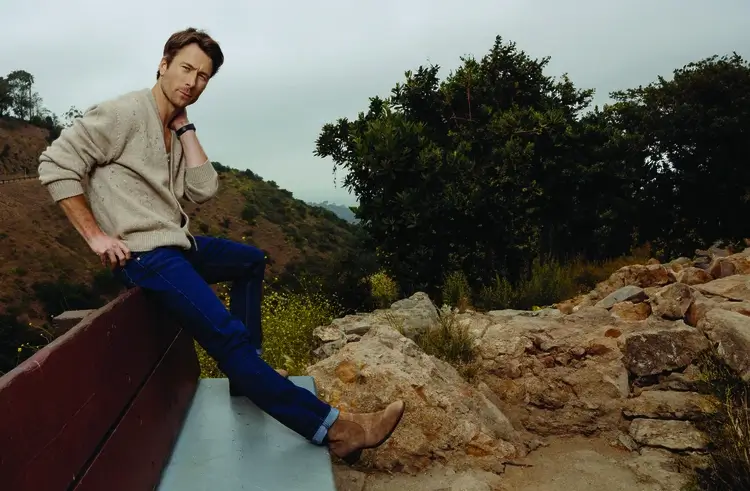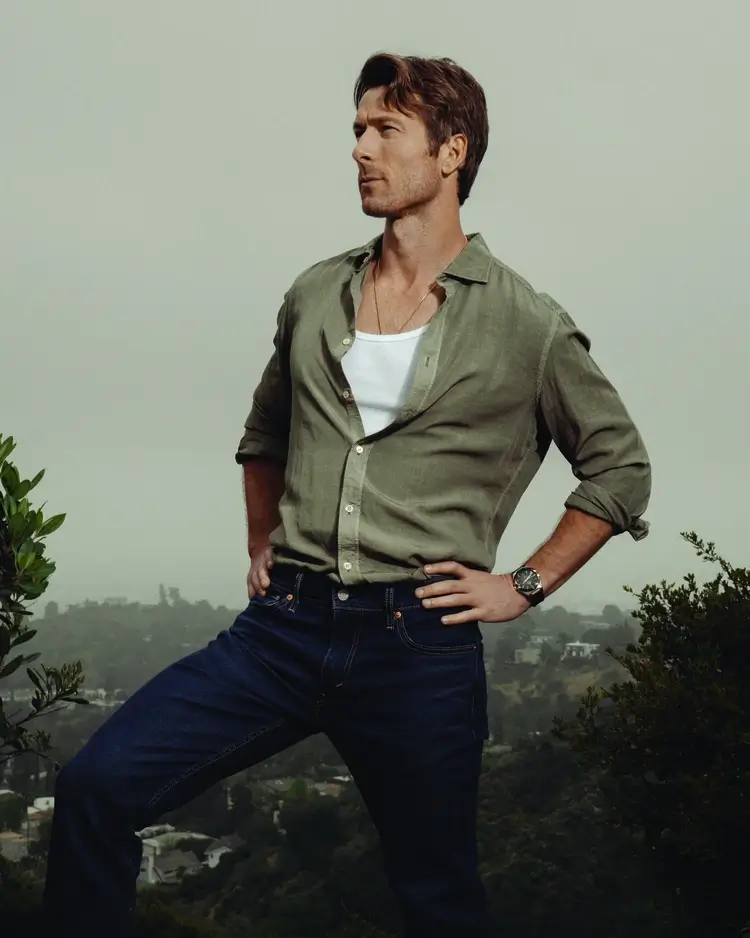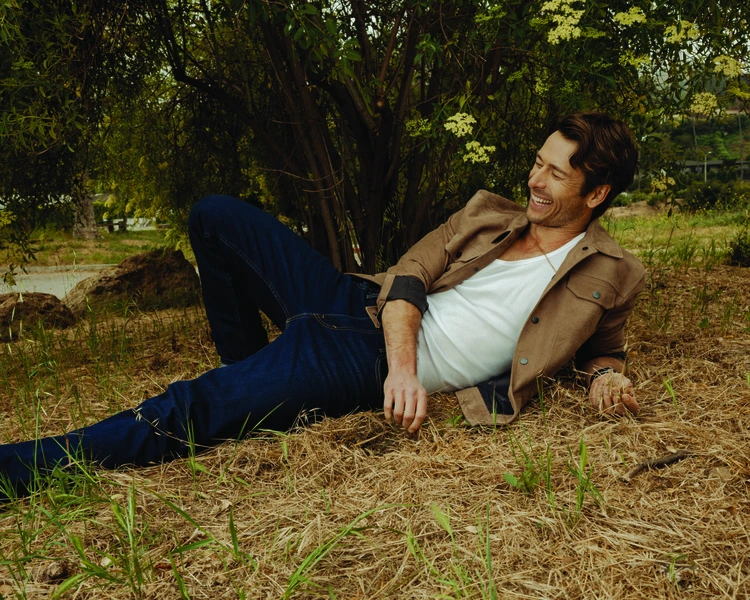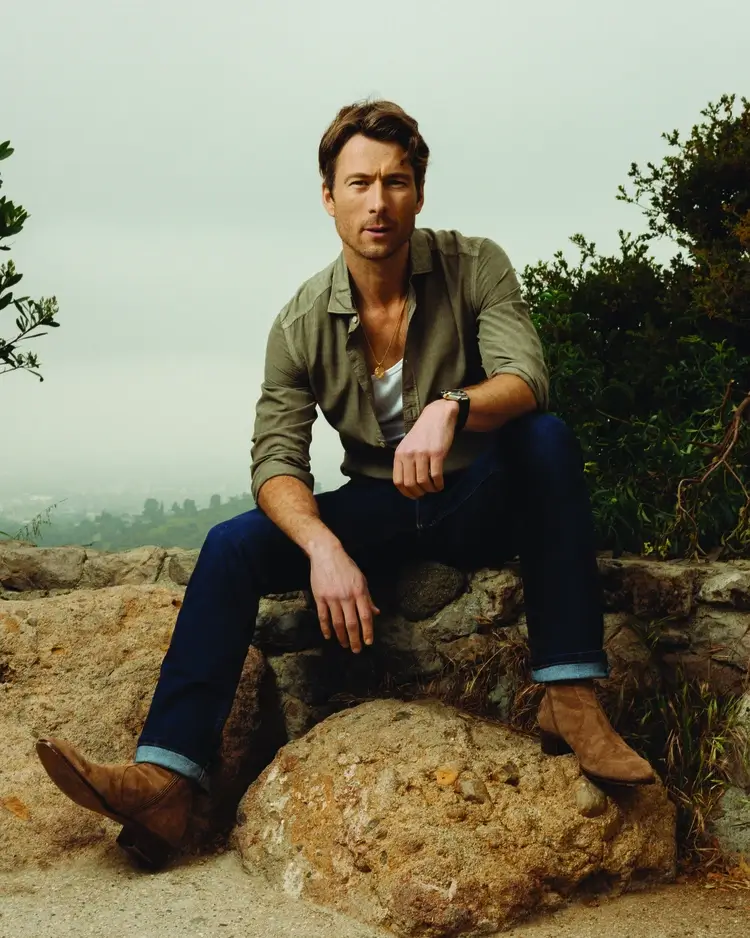Glen Powell has the polish of a studio idol and the comedic reflexes of a short-order cook at rush hour—grinning while juggling six skillets, never singeing the sole meunière. Hollywood, which still believes it can engineer charisma like a soundstage sunrise, keeps discovering that Powell arrives with his own generator.
His curriculum vitae reads like a set designer’s sketchbook: the cocky aviator in Top Gun: Maverick; the raffish romantic conspirator in Anyone But You; the tornado-flirting cowboy in Twisters with his collar open to the prairie wind; and—most revealingly—the slippery, brainy, mercurial chameleon in Hit Man, the Linklater lark that turned into a meditation on desire, disguise, and the pleasure of pretending. Somewhere between storm clouds and screwball noir, the consensus crystallized—Glen Powell is a movie star, not because the industry blessed him, but because he insists on earning the title one cunning turn at a time.
With the unhurried air of a Texan who knows when to pour another coffee and when to step on the gas, Powell treats stardom less as a coronation than a puzzle: how to deliver the goods without underestimating the buyer. Each choice feels reverse-engineered from audience pulse rather than personal vanity. In a polarized era, Powell is the rare modern leading man who can meet an audience where they live without condescension. This working philosophy recurs across his choices, from tentpole gale force to rom-com revival. He’s the exemplar of a particular American archetype we desperately need right now: the guy who can swagger and still ask a sincere question about how you’re doing.
With the unhurried air of a Texan who knows when to pour another coffee and when to step on the gas, Powell treats stardom less as a coronation than a puzzle: how to deliver the goods without underestimating the buyer. Each choice feels reverse-engineered from audience pulse rather than personal vanity. In a polarized era, Powell is the rare modern leading man who can meet an audience where they live without condescension. This working philosophy recurs across his choices, from tentpole gale force to rom-com revival. He’s the exemplar of a particular American archetype we desperately need right now: the guy who can swagger and still ask a sincere question about how you’re doing.
Hit Man was the crucible. Powell plays a mild professor moonlighting as a fake contract killer who talks would-be criminals out of their worst impulses. He co-wrote it, produced it, and conjured a new shade of high voltage charm—part silk-gloved Cary Grant misdirection, part Texas front porch candor. Look closely and you can see Powell assemble the persona like a watch mechanism: his voice gathering ballast, posture spreading his shoulders, his baby blues narrowing with an amused squint as if he’s a beat ahead of whatever’s coming. The revelation is not generic; it’s Powell’s tonal control, the way he treats identity as an athletic drill. He does reps at embodying characters, and then sprints back to himself.
Now, the monitor glow is football. His new Hulu series, Chad Powers, gives us Powell in a shag wig, prosthetic nose, disguising himself to walk on to a college team in trouble. On paper, it’s a caper; onscreen, it’s a fable about second chances disguised as bad ideas. The old American daydream: walk on the team, start over, test the world.
Powell invents a folk hero in cleats and dares us not to love him. Prosthetics are the dare. Can charm survive a rubber intermission? From the masters in the latex arts—Cruise, Bale, Farrell—he borrowed one blunt rule: when the character rings true, the rubber becomes the runway. And that’s the creed of Chad Powers: sometimes you uncover your truest self by pretending to be someone else. With the Georgia sun pressing down like penance, he tackles land with the thump of real collisions; the pocket is claustrophobic; inside the helmet, private weather howls. The mustache is the gag; the sincerity is the tell.
As for his career—call it weather. A gale of summer storms, a winter of noir grin, and now the bass-drum tempo of shoulder pads. Range, here, is less dilettante than survival plan. He carries a marquee-ready name but the tool kit of a character actor built to bench press a franchise. The muscle is craft; the shine is runoff. Vulnerability as magnetism isn’t new; you can sketch a throughline from Newman’s rue to Clooney’s semaphore eyebrows. Powell updates it for the meme century: he’s in on the joke without becoming the bit.
He may look like he was beamed in from central casting, but Powell’s grounding is stubbornly terrestrial. His Austin childhood plays like an early Linklater frame—backyards, bleachers, half-formed dreams lit by the Texas sun—a Friday Night Lights episode that never ends, except the footballer here wound up with a SAG card.
Born October 21, 1988, in Austin, Texas, Powell is now at an age in Hollywood years that makes him young enough to be reckless but old enough to know where the wreckage usually lands. He is the middle sibling—Lauren ahead of him, Leslie trailing—raised in a household where his father, Glen Sr., dispensed executive-coach pragmatism while his mother, Cyndy, kept the entire Powell production upright. The family has a habit of moonlighting in his career: sisters slipping into cameos, parents materializing at premieres, the whole clan treating cinema less as an ivory tower than as an extended backyard barbecue with cameras.
Growing up, Glen was never just the budding actor, he threw himself into sports with the same unabashed zeal he now applies to genres: football pads one season, lacrosse sticks the next, and the occasional curtain call at Westwood High, where he graduated in 2007. Later, at the University of Texas at Austin, he enrolled in radio/TV/film studies and joined Sigma Phi Epsilon—though the lure of the screen pulled him toward L.A. before the degree was done. And yet, after a decade of jet-stream stardom, he circled back home in 2024—less retreat than recalibration, proof that even a marquee name needs Austin air and a family heckle to keep him square. His sense of identity is threaded through sibling laughter, late-night family dinners, and the quiet gravity of people who’ve known him before the spotlight flickered.
If Powell’s screen romances sometimes leave you wondering what his off-camera heart is up to, the story is quieter, more patient, and sprinkled with hints. In 2017 he was linked with Nina Dobrev, the Vampire Diaries star; the two appeared in photos together, laughed in public settings, and then gradually loosened the orbit—no scandal, just the way two schedules can drift apart. Later came a short-term flutter with Renee Bargh, an Australian TV host, which seemed to trail off before it ever caught fire. Then, more publicly, Powell was in a three-year relationship with Gigi Paris, a model whose path often crossed his in press tours and premieres. Their split in April 2023 was attributed to distance and diverging priorities. He’s currently single, but in the balance of his romances you see someone who wagers warmth but insists he’s not giving it away lightly.
Celebrity spoils quickly; dignity requires upkeep. He knows how to surf the gossip tides without drowning in them, how to address craft without falling into self-advertising. His inner circle stays tight, his curiosity feral, the collaborations fast. It’s a blue-collar glamour: less myth, more mileage—the showroom chassis with bug splatter on the grille.
Powell does vulnerability without syrup. He treats openness as a form of toughness, an unfashionable stance in an age that prefers irony’s cologne. He’s also become, perhaps accidentally, a bellwether for whom the industry now defines as bankable. The Powell paradox, then, is that he’s both throwback and prototype. A populist with an auteur’s attention span. Powell isn’t asking us to believe in movie stars again—he’s reminding us we already do.





